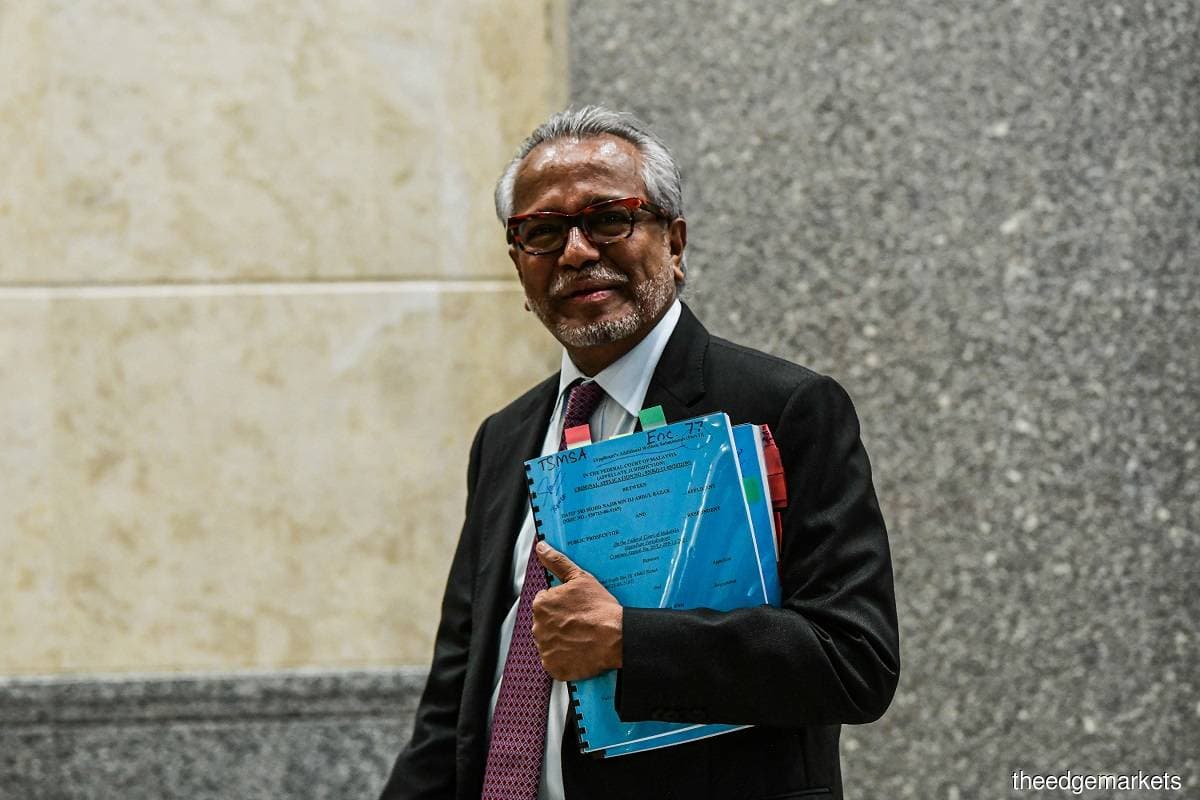
PUTRAJAYA (Feb 21): Chief Justice Tun Tengku Maimun Tuan Mat ought to have discharged herself from hearing or leading the bench in Datuk Seri Najib Razak’s appeal in the SRC International Sdn Bhd case last August, following a past posting on Facebook by her husband which was critical of Najib, the former prime minister's lawyer argued in court on Tuesday (Feb 21).
Najib’s defence counsel Tan Sri Muhammad Shafee Abdullah contended that the Facebook posting by Tengku Maimun’s husband (Datuk Mohd Zamani Ibrahim) in 2018 after the 14th general election, which was critical of Najib and 1Malaysia Development Bhd (1MDB) and its former subsidiary SRC, was reason enough for her to discharge herself from presiding on the bench.
Her presence, Shafee added, raised questions which Najib had raised himself in his affidavit of support for the disqualification.
“This created a conflict of interest by virtue of her husband’s posting,” Shafee argued in a review application hearing by a Federal Court bench of the apex court's decision last year to dismiss Najib's appeal against his conviction by the High Court. The apex cout also upheld the High Court's 12-year jail sentence and RM210 fine against the former PM.
“What is important to note is that after the matter was raised last August, the posting was subsequently deleted.”
Shafee said this was akin to the second case of extradition to Spain of former Chilean dictator Augusto Pinochet, where the House of Lords struck out an earlier decision as Lord Leonard Hubert Hoffman, who was part of the five-member bench, had not declared his interests or links to Amnesty International, which was one of the intervenors in the case.
Here, the senior lawyer said, the House of Lords did not recognise the earlier decision just because Hoffman did not declare his links.
In Najib’s appeal, the CJ’s husband had made the posting, Shafee said, adding that like any “average marital relationship”, there is a possibility that Zamani had discussed such matters with his wife.
“This amounts to a disqualification, and there is a quorum failure, as the CJ would be disqualified as her husband had blamed Najib for 1MDB and SRC’s downfall. Surely, you will be sharing a lot of information [in such a relationship],” Shafee argued.
This created a possible perception of bias, Shafee said, adding that if Tengku Maimun had discharged herself, it would have resulted in a quorum failure, and a new bench would have had to be constituted.
“Interestingly, the bench or judge who had been vocal against this motion brought about by Najib’s then counsel Hisyam Teh Poh Teik over the posting was Tengku Maimun herself, and she stood to remain on the bench,” the senior lawyer said.
When in such an "instance of conflict" and "highly charged case", he said, the CJ should have discharged herself and empanelled another bench to hear the appeal.
“She was obviously disqualified to be on the bench, and this comes to Pinochet's second case,” Shafee said. He observed that the earlier apex bench had not dealt with the appeal against Najib's sentence, adding that the RM210 million fine was "astounding".
Federal Court judge Datuk Vernon Ong Lam Kiat then intervened to ask for cases where a High Court judge was required to recuse himself or herself, and where he or she had to decide for himself or herself.
Shafee replied that this was different, as the decision to recuse oneself could be taken up on appeal, as there were two other avenues of appeal in the Court of Appeal and the Federal Court.
In this instance, he said that was why Najib had pursued the review application owing to Tengku Maimun’s presence, and her decision to remain on the bench to hear the appeal.
Courts considered 'God on earth to dispose justice'
In his submissions, Shafee said that courts function as "possibly God on earth" in disposing justice, as they should uphold the Federal Constitution, and ensure the rule of law, natural justice, and to make sure there is no breach of justice.
He said that the integrity of the Federal Court is at stake.
“It requires the apex court, which is the highest in the country, to ensure and have the obligation and duty to ensure justice in the administration of justice is done. It has nothing to do with the personality involved, but the courts must be seen to dispense justice and the rule of law,” he added.
Najib is serving 12 years' jail, after his conviction and sentence were upheld by the Federal Court. He had been found guilty by the High Court of three counts each of criminal breach of trust, and money laundering of RM42 million of SRC funds, and abuse of power pertaining to RM4 billion in loans by state-controlled Retirement Fund Inc (KWAP) to SRC.
Najib wants a review of the conviction and sentence affirmed by the apex court, and a retrial.
Chief Judge of Sabah and Sarawak Datuk Abdul Rahman Sebli leads the five-member bench hearing the review application. The bench also comprises Ong, Federal Court judges Datuk Rhodzhariah Bujang and Datuk Nordin Hassan, and Court of Appeal judge Datuk Abu Bakar Jais. The review application will continue on Wednesday with the prosecution’s reply.